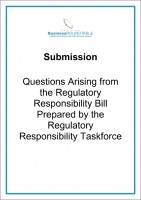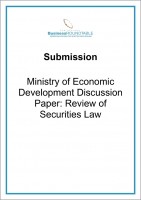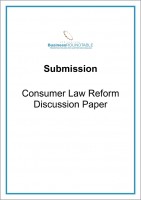This Year's 2025 Taskforce Report an Important Stocktake
Next month the 2025 Taskforce will be delivering its second report to the government. It is the most important taskforce reporting this year. Read more

Next month the 2025 Taskforce will be delivering its second report to the government. It is the most important taskforce reporting this year. Read more
Here’s a quick quiz. First question: Name a wealthy country where either party to an employment contract is free to terminate it at any time, provided they give notice. Read more
Last month Rebecca Macfie wrote an article in the Listener entitled “Our slack bosses”. In it she argued that “one of New Zealand’s dirtiest little secrets is that our businesses are not very well managed” and that “the poor quality of New Zealand managers is holding the country back”. Read more

The Business Roundtable has supported proposals for a Regulatory Responsibility Act from the time of its 2001 report Constraining Government Regulation. We made submissions to the select committee that considered the earlier Members Bill. Read more
The savings debate has not always been well-informed, and it’s good that the government has put together a well qualified group to advise it. The last official inquiry was part of the 2001 McLeod Tax Review. Read more

A goal is not a strategy concludes that New Zealand needs to focus on the internationalisation of high value, differentiated export sectors, prioritise labour productivity improvement efforts on these sectors, and reallocate resources from low to high productivity sectors.
DOWNLOAD EXECUTIVE SUMMARY Read more

The Business Roundtable does not propose to individually address each of the 204 questions presented in the Discussion Paper but instead address five key issues arising from it. These include: The public policy framework for evaluating New Zealand's securities laws; the scope of the securities laws; the substantive duties of disclosure; the standards of liability under the securities laws; and the securities law reform process. Read more
John Maynard Keynes once wrote: “There is no harm in being sometimes wrong – especially if one is promptly found out.” Unfortunately for the world, the problems with Keynes’ ideas were not discovered promptly, and the lessons were too soon forgotten as Keynesian thinking enjoyed a revival with the recent global financial crisis and subsequent recession. At the time of the Great Depression in the 1930s, Keynes advocated fiscal stimulus – higher government spending or tax reductions – to boost total spending in the economy and put the unemployed back into jobs. Read more
In recent years Statistics NZ has done an excellent job of shedding light on the productivity performance of the economy. It made a further contribution with a release last month of productivity statistics at the industry level for the years 1978-2008. Read more

This submission focuses on making three high-level comments on the discussion paper: problem definition, the need for the law to protect reputable suppliers and customers alike, and the case for general and enduring statute law rather than for detailed law that can quickly become obsolescent. Read more
Parliament is considering a bill to amend the Local Government Act 2002 passed by the last government. It is a chance to improve democracy and performance in our councils. Read more
A few weeks ago I decided to look out for examples of economic fallacies that routinely appear in our media. It didn’t take long to make a list. Read more
It’s often said that “politics is the art of the possible”, usually by politicians who know they should be doing something in the overall national interest but aren’t willing or able to do it. The contrast is with Winston Churchill’s statement, “It is no use saying ‘we are doing our best’. Read more

The Business Roundtable is pleased that the government is giving effect to its manifesto commitment to hold another referendum on the voting system. This was expected by many voters when the mixed-member proportional (MMP) system was introduced. Read more
A fundamental law of economics is that you can control the price of something or the quantity supplied, but not both. We saw that law in operation in the old Soviet system, with rationing and queues, and during the Muldoon wage and price freeze. Read more